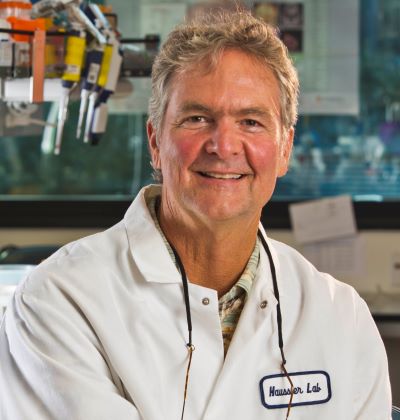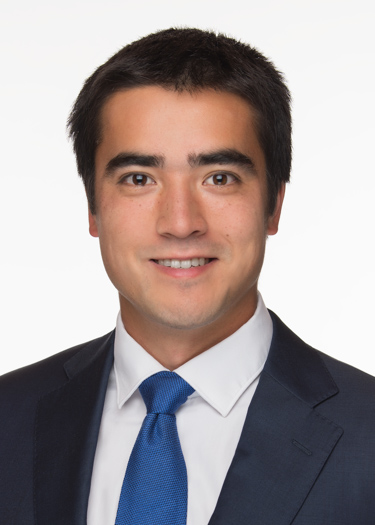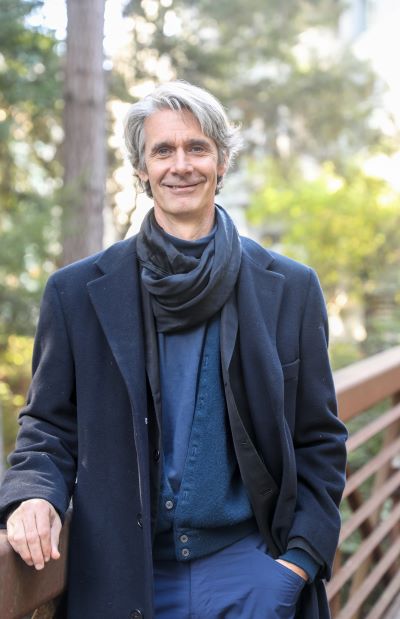Two UC Santa Cruz research teams that can make impactful advancements in drug discovery and human health outcomes have been chosen as recipients of the university’s inaugural Innovation Catalyst Grants program. These new grants, administered by the Innovation & Business Engagement Hub, are designed to support and propel early-stage technology innovations developed by UCSC researchers.
This year’s grant recipients are David Haussler, distinguished professor of biomolecular engineering and scientific director of the Genomics Institute with Mircea Teodorescu, associate professor of electrical and computer engineering, and Ted Holman, professor of chemistry and biochemistry.
Haussler and Teodorescu were awarded $50,000 for their work in developing a revolutionary approach to cell culture that allows for more efficient testing on human organoids. Their innovation eliminates the need for traditional incubators in cell culture by using “incubator-free” vessels that do not rely on air intermediates for gas regulation. This breakthrough technology promises to significantly enhance the realism and scalability of experiments in biological research and will enable higher-fidelity experiments in all areas of biology. The device will also allow for new discoveries in cancer treatment, stroke, heart attack, and brain development research.
Yohei Rosen, a postdoctoral scholar who works closely with Haussler and Teodorescu at the Genomics Institute, is leading the project.
“The Innovation Catalyst Grant is a huge help in accelerating our development of a new method of cell culture. It gives us the freedom to validate and scale our technology outside of the constraints of traditional research grants,” Rosen said. “Internally, the technology we are developing is an important part of the Genomics Institute’s big push to deploy transformative technologies for computer-integrated, automated biology. We are excited that the grant is taking this even further, supporting our ability to de-risk our invention to allow its commercialization. This will allow the technology to stand on its own outside of UCSC, helping external groups perform new experiments we haven't even imagined yet.”
Ted Holman, professor of chemistry and biochemistry, received $41,520 to help fund work on a therapeutic for heart bypass and transplant patients. Holman’s project is focused on jumpstarting the drug discovery process for cardiac ischemia-reperfusion injury (CIRI) by developing a novel human 12-lipoxygenase (12-LOX) inhibitor, determining its properties, demonstrating its effectiveness in a mouse model.
Approximately 350,000 people in the United States receive heart bypass surgery every year, with more than 90,000 experiencing CIRI after surgery. There are currently no therapies on the market to prevent CIRI, so Holman’s innovation could not only save the healthcare industry and patients from costly surgeries but, more importantly, it could save lives.
“The money from the Innovation Catalyst Grant is crucial because it will help me gather preliminary pharmacokinetic and efficacy data, which can subsequently be used to inform the formulation and establish the case for follow-on funding to further develop this treatment,” said Holman.
The Innovation Catalyst Grant program, which was established to foster transformative change and societal impact through innovation, provides targeted gap funding, training, mentorship, and support to UC Santa Cruz researchers. The program helps de-risk and validate the implementation and adoption potential of cutting-edge technology innovations from the university.
Haussler and Holman’s teams also participated in the Lean Launchpad workshop series as part of the program, which provided them with training on identifying pathways for adoption and implementation and finding a scalable business model through the customer discovery process. The series taught them how to better translate their science to potential funding agencies. In addition to this training, both teams are working with industry mentors from the external Selection Committee who are providing direct market insights and guidance on advancing the innovations.
“Securing resources to de-risk and validate an early-stage innovation has been a longstanding challenge for university researchers,” said Ryan Sharp, assistant vice chancellor of Innovation & Business Engagement, who is overseeing the program. “This work is at a stage generally beyond the scope of basic research funding but is typically necessary to position the innovation for attracting investment capital. I am thrilled that we launched the Innovation Catalyst Grant program this year to help fill this gap in the innovation capital landscape while also providing our researchers with the knowledge and tools necessary to navigate the pathway to innovation implementation and adoption.”
For more information about the Innovation Catalyst Grant program and the groundbreaking research at UC Santa Cruz, please visit the Office of Research website.





